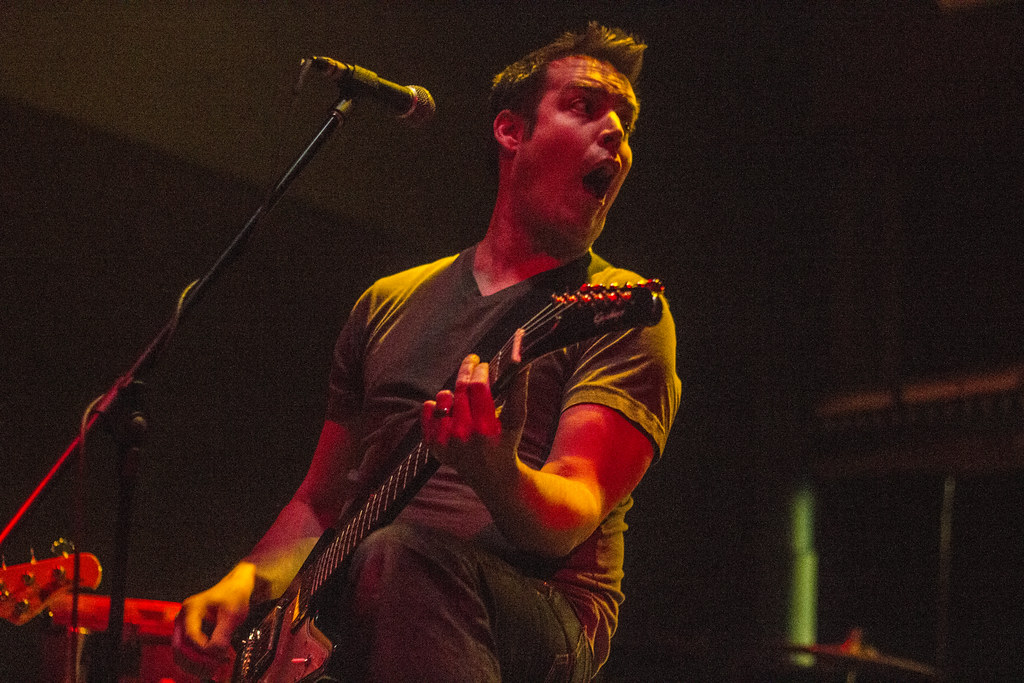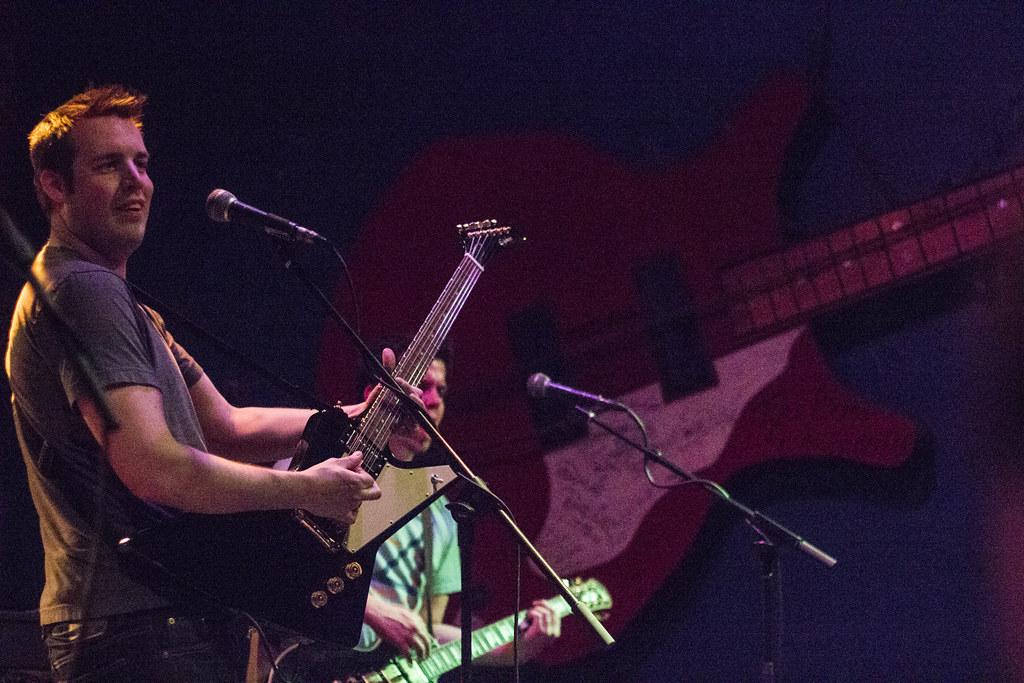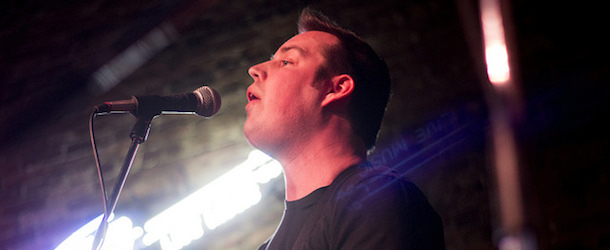by Andrew Stellmon
Those unfamiliar with the backstory to Lincoln’s Thirst Things First might understandably find it befuddling at first glance.
It goes that “Boot:\\”, a transmission dressed somewhat like a cop from the future Sector O, a faraway planet, selected two telemarketers to play in a band and communicate his ideals. He deployed a joint operative robotic drummer, or J.O.R.D., and brought on Laser, who lives in his grandmother’s basement. Each band member was chosen for their fruitless jobs and boring lives, in order to devote full attention to the cause.
In Boot::\\’s world, any liquid imbibed or used as currency is called oil, and oil is good. Sand is the enemy. At Thirst Things First shows, a pre-recorded Boot:\\, displayed on a computer monitor, propagandizes and pokes fun at other bands, venues and Lincoln music scene figures.
The Thirst Things First website reads as a series of messages from Boot:\\. Whenever the band receives an interview request, the media outlet receives an electronic brief or a Skype session with the transmission. When Boot:\\’s transmission fails during a show, the band is useless.
If this all sounds as random as Adult Swim programming, a hodge-podge of ideas kicked around during late-night drinking sessions, that’s sort of how it came about.
It is also, of course, all a ruse for the pop-punk act comprised of guitarist and frontman Mikey Elfers (formerly of JV Allstars), guitarist/vocalist Alec Wise, bassist Nathan Olson (formerly of Straight Outta Junior High), and drummer Jordy Elfers (also of Powers). Boot:\\ is played by Mikey, and almost every aspect of their public image is meant to look as if Boot:\\ had created and manipulated them into dispensing his propaganda. In reality, there is significantly more to it than that.
Mikey explains that the story behind Thirst Things First simmered for more than a year prior to any actual songwriting.
“Alec and I are drinking whiskey, talking about the band, and what is this transmission’s sole purpose … what if money and drinks are actually called oil where he’s from. Like marklar. Like everything is called oil. I kinda wanted him to have an inanimate object as a name. And then we thought ‘Boot’ because it kinda fit computer terminology.”
Jordan adds, “The original thing was kind of Max Headroom style.”
The tale permeates what the band does at every level, from the characters that they play during their eccentric live show, to the subject matter of their material, right down to the video game beeps, reminiscent of Sonic the Hedgehog, that provide undercurrent to their songs.
During band member rap sessions, anything anyone says becomes law, and is then converted into the language of Boot:\\ as though it were run through a computer program. Words are stretched out, twisted, or altered to sound futuristic. This framework is a sort of prism through which Mikey filters anything from Bloody Marys to deceased acquaintances. On the other side, they are assimilated into the sci-fi world of Boot:\\
Friday at Knickerbockers, they will release material fresh from the filter in SEXAPHONE, the EP follow up to last year’s LP1. RSVP here.

* * *
The title of the EP, like the record itself, is a tribute to Mikey Elfers’ former neighbor, Todd, a Gulf War helicopter pilot who passed away in his apartment in February 2012. Todd had wrecked his helicopter during the war, had to be resuscitated, and was sent home with the Purple Heart.
“He was like a neighborhood legend, he talked to everybody,” Mikey explains. “He was a character. He had all these crazy stories about how he partied with Santana and he was a comedian in an old folks’ home and blah blah … it was kind of like Big Fish.”
The day Mikey moved into the apartment complex, Todd accosted him to explain the unwritten rules of the building, before offering to pick up groceries for him. They got to know each other and formed the sort of relationship that people tend to in such close quarters. More than just nodding in passing, the pair would hang out casually from time to time.
“He found out that my friend Donnie plays saxophone in the [ska] band [staying at my apartment]. He said ‘you know what I call the saxophone, I call it the ‘sexaphone’ because it makes all women want to have sex with you. It’s my favorite instrument of all time.’ So, I was like, well, I have to write a song about that, and we ended up naming the record after it.”
Todd’s death meaningfully affected Mikey. It was his closest contact with the death of another person, which makes Friday’s EP release show all the more important to him.
“He had this small funeral, this dismal life in this one bedroom apartment. But I feel like now we get to have this party that he’s a part of.”

photo by Cameron Bruegger
Musically, SEXAPHONE picks up where LP1 left off, with electro-laden pop punk that might have been the love child of a revved-up Devo and a Sega Genesis. Distorted power chords and memorable pop-punk hooks push the songs forward to upbeat, driving rock rhythms, all set to the undercurrent of an array of video game noises. The EP lifts off with “HELLA-COPTER,” promising to “fly a lot further than you’ll ever imagine.” “ITS A TRAP” creates the ominous feeling of entering the ultimate stage of a platform video game to face the final boss, complete with low octave electric noises echoing the vocals. You might have cleared the level by the sound of the EP’s stand-out title track marked by a catchy chorus and searing lead guitar work. “III” puts a ribbon the record with a eulogy for Mikey’s deceased neighbor.
* * *
The challenge for Thirst Things First, conceived on a rolling snowball of an inside joke, is to create a listening and live experience that is well-received and relatable. The potential for its success exists in large part due to their experiences with other bands. Not only are they accomplished musicians, but Mikey’s ability to weave the story into their pop-punk sound makes the band highly accessible, even if listeners are not hip to his lingo.
“It’s got some pop to it. It’s the 8-bit versions of the noises that they hear on the radio everyday anyway,” Jordan says.
As much as it helps that they produce quality rock songs, it works to their advantage that they present them in the live show as part of a bizarre theatrical performance.
This line of logic is not without precedent. Elfers cites examples like former Omaha indie rock band Tilly and the Wall and Lincoln’s The Machete Archive when explaining how a band with an uncommon trait draws the audience out to a show. For Tilly and the Wall, it’s their use of tap-dancing in lieu of conventional percussion.
“Everybody thought it was this cool thing so people went to their shows like ‘oh she’s a tap dancer, that takes so much talent,’” Mikey says.
Mikey says he observed that the now-defunct The Machete Archive’s instrumental prog-rock style worked in a similar way for them. Having a clear association of an aspect of live performance with one’s band can bring followers out in droves.
“People would go around Lincoln and be like ‘you gotta hear this band, they’re instrumental, it’s crazy, no one has ever done this before!,’” Mikey says.
Neither instrumental rock nor tapdancing are necessarily unique. Tilly and the Wall made use of their gimmick unconventionally, but it is nowhere near as all-consuming as the concept created by Thirst Things First. Attending their show for the first time might actually mean that one is witnessing a never-before-seen event.
* * *
One goal of the band is to make digestible music for an audience that isn’t always musically literate. Mikey explains that bands like Weezer or Queens of the Stone Age, for instance, so meticulously assemble their music and have such great talent that it becomes the focus of the performance or record. To non-musicians or casual fans, that could be a hindrance in keeping their attention during a live performance.
While not neglecting the quality of the music itself, the band aims to leave an impression in additional, equally important ways.
“Sometimes a gimmick is going to please someone that doesn’t know music very well. It’s going to pop out more or they’re going to say, ‘Oh, this band is doing so much,’” Mikey says.
A giant computer screen with Boot:\\’s face on it is certainly one way to do it.
Mikey spends a significant amount of time prior to each show choreographing the Thirst Things First set to ensure that it is tightly controlled. At home, he dons the cap, sunglasses and uniform, and transforms into Boot:\\, recording cues for the band and flinging barbs at the rest of the billing. Boot:\\ frequently refers to other acts as a “no-name human rock band” and urges the audience to drink as much “oil” as possible.
The “transmission” video that plays on a large monitor above the band forms the backbone of their performance.
Jordan notes, “It’s visually stimulating … someone who will pop on KFRX in their car and not pay attention to the music. [They] will go to a show, and it’ll still be background for them, but they’ll have something to watch. It’s for our generation of no attention span.”
The entire set is plotted; the run time is calculated down to the second before the show even starts. But it only works as well as the equipment it relies on, a fact the band grappled with early. Without a computer screen, there is no Boot:\\. Without Boot:\\, there is no Thirst Things First.
“We played at Vega and Jordan’s computer finally took a shit in front of everyone. And someone was like, ‘What do you guys do at this point?’ Well, we don’t try to play,” Mikey says.
“Now we are definitely trying to create some precautions. I always carry an mp3 player with me that just has the audio so that worst case we can just play. Worst case is, sorry I have a virus, here’s our set,” Mikey explains.
* * *
From what they have observed, the onstage theatrics of Thirst Things First are mostly well-received.
On April 18, Thirst Things First played at Vega for Earthstock UNL, an event to promote sustainability, with Lincoln’s AZP and A Ferocious Jungle Cat.
“We had a super, super cool reception from that show,” Jordan recalls. “I looked up half way through the set and expected all these 21-year-old college students to be [off-put], but the whole front row was dancing and some dude wearing boat shoes and khakis was dancing with his little girlfriend.”
Inevitably, though, someone is going to take Boot:\\’s vitriol personally.
At the Earthstock event, centered on environmental sustainability, Thirst Things First noticed some people were upset by the sheer volume of references to oil, which Mikey swears is simply a coincidence. In fact, one might interpret the ridiculousness of it all as a kind of satire, even if unintentional.

photo by Cameron Bruegger
When Mikey deliberately embellishes with Boot:\\, no one is safe from his venom. The band doesn’t seem to care whether or not the bands they play with are offended. Its something to be expected, especially in Lincoln’s insular music community.
“I think there’s kind of an overtone of camaraderie in Lincoln. Lincoln’s a music city and we have all these great blogs. Everybody is used to being complimented all the time, so just the slightest hint of poking fun or making fun of some people, they don’t know how to handle it because they’ve never heard it. Whereas if you play shows across the country, someone is going to tell you [that] you suck to your face.”
It’s a perspective born out of more than a decade of touring with, JV Allstars. In Mikey’s thinking, it’s better to take a realistic approach to the fact that someone may not like your band. Press on, and try to reach an audience that identifies with what your band is trying to accomplish.
“I’ve always gone back to the fact that these weird bands are always the one that people go back to even if they’re not good. So the idea was that we’d start a band that was totally dumb, and let’s maybe see if we can make the music [sound] OK, and see if people will get it.”
Andrew Stellmon is a Hear Nebraska contributor. Reach him via HN’s managing editor at chancesp@hearnebraska.org





